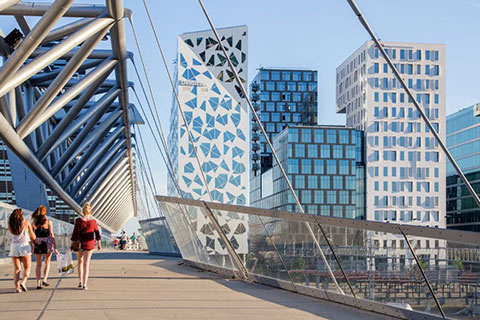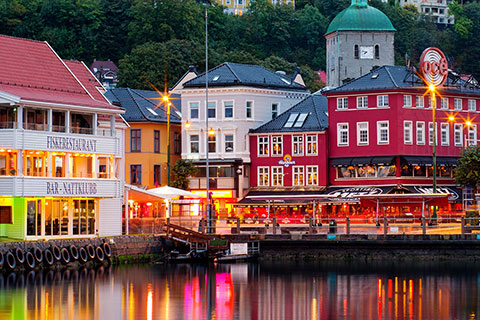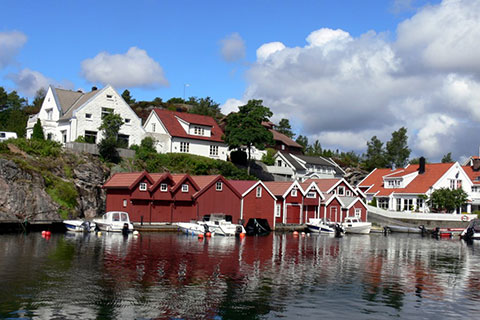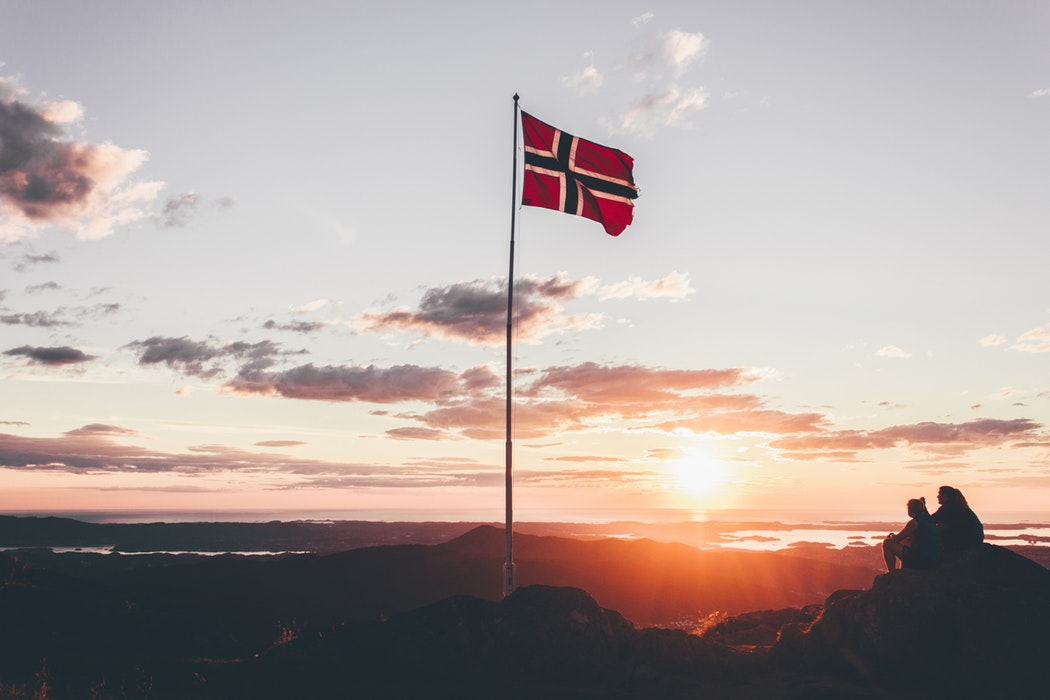
Study in Norway
Last edited on 08 Feb 2026
Welcome to Norway!
Norway offers you a unique student experience and Norwegian institutions of higher education welcome applications sent by qualified students from all over the world.
Norway is well known for its mountains, fjord coastline, sea-faring history, unique coastal life, midnight sunlight during the summer months, and brilliant Winter Olympics performance. Norway’s renowned fjords include Geirangerfjord in the Sunnmøre region (listed as a UNESCO World Heritage Site), Sognefjord (the longest) and the Hardangerfjord (the second-largest and one of the most visited). Another major driver of tourism to Norway is the stunning Arctic Circle phenomena known as aurora borealis (or the northern lights). It’s also a popular choice for international study, offering a good selection of universities, including four entries in the QS World University Rankings® 2016/17.
Internationalization is a priority within all sectors of the Norwegian education system, and universities and university colleges are constantly working to facilitate for international students. Around 15 000 foreign nationals are currently enrolled at Norwegian institutions of higher education. International students may apply for admission to a variety of undergraduate and graduate degree programmes. You may come to Norway as student through established exchange programmes, institutional agreements or as a so called "free mover", where you arrange the stay by yourself (type of study, length and financing).
Due in part to its offshore oil and gas deposits, Norway has the fourth-highest per capita income in the world and one of the highest standards of living. It’s a member of many international organizations, including the UN, NATO, the Council of Europe and the Nordic Council, the WTO and the OECD. It’s also part of the Schengen Area, and maintains close ties with the US and the European Union (EU), despite rejecting full EU membership.
If all that appeals but you’re worried about losing a digit in the freezing cold, worry no more! The warm Gulf Stream means Norway isn’t actually as cold as you might imagine. With coastal areas being relatively mild and average winter temperatures rarely dipping below -4oC (24.8oF) in capital city Oslo, one can venture around fairly comfortably (in layers, yes, but without turning blue).
Higher Education System
With a wide range of high quality courses and great flexibility, Norwegian institutions prove to be an ideal study destination. From vocational subjects to postgraduate and doctorate level, there are plenty of opportunities for students to fulfil their ambitions. You will also benefit from the informal atmosphere at Norwegian universities and university colleges, where teachers are easily approachable and tuition often takes place in small groups. Most institutions also have well equipped computer facilities with free Internet access.
Norway has seven accredited universities, nine accredited specialized university institutions, 22 accredited university colleges, two accredited national colleges of the arts and several private institutions of higher education with either institutional- or programme accreditation.
The Norwegian system of higher education comprises all the institutions and/or programmes that are accredited. With the exception of some private university colleges, all higher education institutions are state-run. In general, tuition is not required for study at Norwegian higher education institutions, although fees may be imposed for certain professional education programmes, further and special education programmes and studies at private institutions.
In addition to their teaching activities, all the higher learning institutions, and particularly the universities, are responsible for conducting basic research as well as researcher training, primarily by means of graduate-level studies and doctoral degree programmes.
Since 2003 Norway has been following the objectives of the Bologna process in the European higher education. Most of the elements have been implemented through the Quality Reform. Central to the reform has been implementation of a 3 + 2 + 3 degree system with a Bachelor's, Masters and Ph.D. structure following the European standards
With the introduction of the new degree system it has become easier for students who complete all, or part of their education in Norway, to obtain recognition for their qualifications in other countries.
Credits system and grading
The academic year normally runs from mid-August to mid-June. Courses are measured in “studiepoeng” according to the ECTS standard (European Credit Transfer System credits). The full-time workload for one academic year is 60 “studiepoeng”/ECTS credits.
Grades for undergraduate and postgraduate examinations are awarded according to a graded scale from A (highest) to F (lowest), with E as the minimum pass grade. A pass/fail mark is given for some examinations.
(source: https://www.studyinnorway.no/study-in-norway/Education-system)
Student Cities in Norway
Oslo

The economic and governmental center of Norway, capital city Oslo is also a thriving trade hub which includes the banking and maritime industries. Oslo has been repeatedly listed as one of the world’s most expensive cities, but it also ranks highly for quality of life.
Due to its fast-growing immigrant population, Oslo is known as the ‘melting pot’ of Norway, with continuous influxes of people from all over the world (the largest groups coming from Sweden, Poland and Pakistan). The resulting cultural and ethnic diversity means there’s no end to variety in Oslo’s cuisines, arts and shopping experiences.
Full of life and culture, Oslo’s city center is easy to travel around on foot, and offers a good selection of museums, galleries, cafés, music venues, festivals and nightlife, as well as being home to some of Norway’s wealthiest celebrities. It’s also easy to access the great outdoors from Oslo – popular pastimes include hiking, fresh-water swimming (just don’t swim in Maridalsvannet lake – it provides drinking water for the city!) watersports, cross-country skiing, ice-skating and cycling.
The University of Oslo is the highest-ranked university in Norway, at joint 113th in the QS World University Rankings 2016/17. Also of note among universities in Oslo are BI Norwegian Business School, Oslo University College (which offers many courses in English including the European Project Semester), the Norwegian School of Sports Sciences, the Oslo School of Architecture, the Norwegian Academy of Music and the Norwegian University of Life Sciences.
Bergen

Norway’s second-largest city, Bergen is located on the west coast, and is a popular base for visitors exploring the country’s famous fjords – long, narrow stretches of water bordered by steep cliffs (this might not sound much, but they really are spectacular). The city is surrounded by mountains, earning it the nickname ‘the city of seven mountains’, which makes it perfect for hiking in summer and skiing or sledging in winter.
As well as being ‘The Gateway to the Fjords’, Bergen is an attractive coastal city, with its historic harbor area, Bryggen, included on the UNESCO World Heritage list. Hanging out at the beach is a popular summer activity, with clean, fresh and comparatively warm waters and plenty of sandy beaches.
The city is an international center for aquaculture, shipping, offshore petroleum subsea technology, tourism, finance and higher education. Bergen’s cultural contribution is also of note, and it has supported the growth of many of Norway’s indie bands and artists. Bergenfest music festival runs from April to May and is joined by the week-long Bergen International Film Festival, the Bergen Reggae Festival, the Bergen International Festival and the two-week long Nattjazz – the longest jazz festival in Europe. And, if the Bergen nightlife lacks in grandeur, it makes up for this in variety, with a range of smaller venues that often make for a more intimate and memorable atmosphere.
Bergen is home to the third-largest and second highest-ranked university in Norway: the University of Bergen, joint 177th in the QS World University Rankings 2016/17. Other universities in Bergen include Bergen University College, the Norwegian Institute of Marine Research and the Norwegian School of Economics (NHH), one of Norway’s leading business schools.
Tromsø

If you’re really looking for a study destination with a difference, Tromsø could well catch your attention. This relatively small city is mainly located on the island of Tromsøya, close to the northern tip of Norway, and well within the Arctic Circle – which puts it in prime position for those wishing to view the famous aurora borealis (northern lights) in all its glory. Promoted as the ‘capital of the Arctic’, Tromsø is a popular base for those exploring this region – and yes, you guessed it – there are plenty of fjords and mountains nearby (bored of all this natural beauty yet?) and it is in the northernmost part of Norway, meaning it gets the midnight sun during the summer months.
Although small, the city is bustling, with a renowned nightlife (make sure to visit Ølhallen, the Beer Hall), plenty of art, museums and history to soak up, and lots of choice in cuisine, particularly seafood. Architecture students might also enjoy northern Norway’s greatest concentration of wooden houses in Tromsø’s city center, along with northern Europe’s oldest cinema still in use, the Verdensteatret, and the striking design of the modern Arctic Cathedral.
The city is also home to the world’s northernmost university, Tromsø University, which made a good leap from 421-430 to joint 377th in the 2016/17 QS rankings. While there aren’t many universities in Tromsø, it does have plenty of research institutions and a highly skilled population. Tromsø is also where the indigenous Sámi population and culture are most visible.
Trondheim
An old city in Central Norway, Trondheim has a rich cultural heritage. It’s the oldest of Norway’s major cities, meaning there’s a lot to explore in and around the city center. Major attractions include the Nidaros Cathedral, the second-largest church in Northern Europe, historic rock carvings, and Trondheim’s characteristic mansions and harbor houses. Trondheim is also known for its mercantile history and for being the religious center of northern Europe during the Middle Ages.
Although small, Trondheim has plenty to offer in terms of student life, with choices including music, arts, theatre, film fests, alternative politics and sports (skiing and football). You should also venture out to the islet Munkholmen in the north, which has served as a place of execution, a monastery, a fortress, a prison and a World War II anti-aircraft gun station, and is now a popular tourist and recreation site.
In terms of universities in Trondheim, the city is dominated by the Norwegian University of Science and Technology (NTNU), which is ranked 259th in the QS World University Rankings 2016/17. Sør-Trøndelag University College is also based in Trondheim, with other technology-orientated institutions including the SINTEF and St Olav’s University Hospital. NTNU has more than 23,000 students – equal to an eighth of the city’s 184,000 inhabitants. The city is therefore heavily influenced by student culture, at the heart of which is the large Studentersamfundet i Trondhjem, the student society building where concerts, political debates, wine tasting, discussions, discos, football matches, choirs and orchestras are regularly hosted. As you might expect, Trondheim also has a vibrant nightlife, with many pubs and bars open all week and all night.
Kristiansand

Kristiansand (sometimes called Kristiansand S to avoid confusion with Kristiansund in western Norway) is located on the south coast, and is a favorite summer holiday destination for Norwegians, with the sea and surrounding fjords perfect for enjoying Norwegian coastal culture. You may also enjoy the Kristiansand Zoo and Amusement Park east of the city, its active music scene or its many festivals such as the Protestfestival (to address apathy and indifference in politics), the Bragdøya Blues Festival and the International Children’s Film Festival.
Previously important as a military stronghold, Kristiansand is now known as the business capital of southern Norway, and has a large urban area populated by factories (nickel, ice-cream and beer and soft drinks), a refining plant, shipbuilding and repair facilities, and an industrial area known as the Korsvik. It is also an important transport and communications node, connected to continental Europe by air, sea and rail. Despite this, you’ll never be far from a forest in Kristiansand, with popular activities being swimming, fishing, sailing, golfing and enjoying the archipelago near the city called Skjærgården, or Markens Gate, a mainly pedestrianized shopping street.
The University of Adger (UiA) is just east of the town center and relocated from its old military camp campus into a new building in 2001. UiA teaches many subjects, but only a few are taught in English, despite most of Kristiansand’s citizens being fluent English speakers. Other universities in Kristiansand include the Noroff University College, music education at Musikkens hus (House of Music) and several small, private higher education schools including a Christian journalism school and the regional branch of BI Norwegian Business School.
Application, Fees and Visas in Norway
Applying to universities in Norway
Applying to universities in Norway is fairly straightforward. To be accepted onto a degree program, you must have attained a general university admissions certificate (generell studiekompetanse), which you can achieve by completing upper secondary school. International students can find out if their foreign qualifications are recognized using the country-specific GSU-list.
You may instead apply for universities in Norway through the law of 23/5 – you must be above 23 years of age and have 5 years of combined schooling and work experience, and have passed exams in several key subjects (namely Norwegian, mathematics, natural sciences, English and social studies). Some degrees may also ask for qualifications in specific subjects depending on the degree program (such as mathematics and physics for engineering). Keep in mind that each course and university will have its own specific admissions requirements.
When applying for programs taught in English, you will need to apply directly and individually to each institution you are interested in. You’ll usually need to fill in an application form, which is typically available on the institution’s website or by request. Undergraduate courses taught in Norwegian can be applied to using the Norwegian Universities and Colleges Admissions Service (NUCAS).
Tuition fees and funding in Norway
Public education in Norway is free for both local and international students, with the Norwegian Ministry of Education and Research responsible for fees and in general for education. You may be required to pay a small semester fee, typically around NOK300-600 (US$35-71). The semester fee grants you membership to the student welfare organization, access to health services, counselling and sports facilities, an official student card which can give you reduced fares on public transport and lower ticket prices to cultural events, and eligibility for exams. Private universities in Norway do charge tuition fees, as do public universities in the case of a few specialized programs/courses, typically at postgraduate level.
Keep in mind that living costs in Norway are considerably higher than in many other countries, and you will need to cover expenses including housing, books, food and travel. If you need financial assistance, there are various scholarships, fellowships and student loan schemes available for local and international students. Make sure to check whether funding to study in Norway is available from sources in your home country as well, to ensure you’re aware of the full range of options that apply to you.
In order to get a part-time job while studying in Norway, students from outside the EU will need a work permit, and should submit a statement from the institution authorizing that the work will not affect their studies, as well as a letter from the employer confirming the student’s job offer. Students from within the EU do not need a work permit, as permission to work will be granted along with their residence permit. In both cases, students are permitted to work for up to 20 hours per week during term-time, and full-time during the semester breaks.
Fast fact
- Official name: Kingdom of Norway
- ‘Norway’ translates roughly as ‘path to the north’
- Capital city: Oslo
- Constitutional monarchy (currently King Harald V – a largely ceremonial role) and parliamentary democracy
- Head of government is prime minister (currently Erna Solberg)
- Currency: Norwegian krone
- Major religion: Christianity (Lutheran Church of Norway)
- Official language: Norwegian. Also significant is the Sámi language of the indigenous Sámi people in the north. Many Norwegians speak English as a second language.
- Norwegian language has two official written forms: Bokmål and Nynorsk, of which Bokmål is used by the vast majority and Nynorsk is used mostly in the very south.
- Europe’s northernmost country
- Borders with Sweden, Finland and Russia
- Shares longest uninterrupted border within Europe, with Sweden
- Around the same size as Malaysia, but with a total population smaller than that of the Kuala Lumpur metropolitan area alone
- Half of Norway’s surface area is mountain.
- There are as many Norwegian descendants living in the US as there are Norwegians in Norway (according to the US Census Bureau).
- 99% of Norway’s electricity comes from hydropower.
- Early adopter of women’s rights, minority rights, and LGBT rights
- First country to recognize the ILO-convention 169 concerning the rights of indigenous and tribal people
- First Scandinavian country to legalize same-sex marriage
- Major exports: petrol, oil, gas, arms, black metal, machinery, chemicals and fish
- Time zone: Central European Time (UTC+1), UTC+2 in the summer
- International dialing code: +47
- Internet domain: .no






